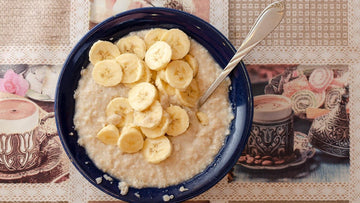Who Anyone who does intensive sports knows the feeling: After the workout, The cravings quickly become noticeable. This is often where the Protein shake, chicken breast or protein bar come into play. But there is another way: With Protein-rich soups allow you to quickly create a filling meal prepare . Whether cooked spontaneously after a hard workout or planned ahead as Part of your meal prepping – protein-rich soups bring variety and seasoning in your diet. But which soups are suitable for sports nutrition? This is one of the questions we will address in this guide!
In In this article you will learn:
- how important protein is for sport,
- how protein works in sports nutrition ,
- how much protein is recommended for athletes per day,
- which cream soups are rich in protein and
- what a 7-day nutrition plan for athletes with Street Soup can look like.
How How important is protein for sports?
protein is immensely important for sport, fitness and health. Proteins help with muscle building, muscle maintenance and also Losing weight. Since a muscle consists of about 20% protein, a Adequate intake of protein per day is essential. This makes long-lasting performance in sports is only possible. Performance improvement is based on the interaction of protein-rich and balanced diet, enough sleep and an effective training plan. Protein is also a building block important for the metabolism and the immune system and helps To preserve bones and connective tissue.
How Does protein work in sports nutrition?
sport and fitness are defined by performance improvement. Athletes want to become faster, more enduring and stronger than on Protein plays a key role in sports nutrition, regardless of of discipline, plays a particularly important role. Protein works How follows in the following sports and fitness disciplines :
- Protein for muscle building : Protein is crucial for muscle building because it provides the body with the necessary amino acids. These amino acids build and repair muscle tissue. Protein also supports the process of muscle protein synthesis, which is necessary for muscle growth. Athletes looking to build muscle benefit from increased protein intake to meet the increased demands during muscle building.
- Protein in endurance sports : In endurance sports, protein is important for maintaining muscle mass and reducing muscle protein breakdown during sustained exercise. It helps maintain muscle integrity and can contribute to improved recovery. Protein also supports the immune system, which can be weakened during intense endurance exercise.
- Protein for explosive strength events : Weightlifting, sprinting, and jumping events all require significant amounts of power and explosiveness. Protein is key to increasing muscle performance and supporting muscle rebuilding and repair after strenuous training sessions. This allows athletes to increase their performance and reduce the risk of injury.
- Protein for flexibility training : Although protein isn't directly essential for flexibility training, it does contribute to muscle recovery and repair. Protein supports the strengthening of muscles and connective tissue to prevent potential injuries.
- Protein for cardio or cardiovascular training : Protein also has its place in this area of training. It promotes recovery after intense cardio workouts, helps maintain muscle mass, and supports muscle protein synthesis, while simultaneously reducing muscle tissue breakdown.
How How much protein per day for athletes?
The hangs depends on the type of training and the intensity . For an intensive training program, approximately 2 g per kg Body weight of protein for athletes per day is recommended. At 90 kg body weight, 2 g per kg body weight corresponds to For example, about 180 g of protein per day. The following guidelines will help for further orientation :
- Maintaining muscle mass and general fitness : For recreational athletes who want to maintain muscle mass and improve their general fitness, a protein intake of approximately 0.8 to 1.2 g of protein per kilogram of body weight per day is recommended.
- Muscle building : For athletes seeking to build muscle, an increased protein intake is recommended, typically in the range of 1.2 to 2.0 g of protein per kilogram of body weight per day. A higher protein intake can meet the increased demands during muscle building and support muscle protein synthesis.
- Endurance sports : For endurance athletes, a protein intake of approximately 1.2 to 1.6 g of protein per kilogram of body weight per day is recommended. Protein plays a role in muscle repair and recovery after long endurance exercises.
- Explosive-strength disciplines : For athletes who participate in explosive-strength disciplines such as weightlifting or sprinting, a protein intake in the range of 1.4 to 2.0 g of protein per kilogram of body weight per day is recommended. Protein is important for muscle strength, power, and repair.
This Recommendations are also based on scientific evidence. For example, a study published in 2023 Study (Kwon J., Nishisaka MM, et al. 2023)[1] the Daily protein intake of football players analyzed in more detail. The study concluded that the Protein intake of athletes depends heavily on the type of activity Athletes who focus on muscle building and strength training tend to consume more protein than their endurance training colleagues. It was found that in the current Season a protein amount of 1.3-1.8 g per kilogram of body weight per day seems to be ideal to increase muscle protein synthesis maximize . Protein intake should be spread over several meals be spread over the day.
Which Cream soups are high in protein?
To the protein-rich Cream soups include, for example:
- Lentil soup : Lentils are an excellent source of plant-based protein. A creamy lentil soup can be made with vegetables, spices, and broth. Lentils also contain fiber and other nutrients. Depending on the type of lentil, the protein content in a cup of lentil soup can range from 15 to 18 grams . Red lentils have the most protein.
- Chickpea soup : Chickpeas are rich in protein and fiber. A creamy chickpea soup can be prepared with spices, vegetables, and broth. It can also be enhanced with tahini or yogurt for added flavor and creaminess. One cup of chickpea soup can provide about 12 to 15 g. contain protein .
- Pea soup : Pea soup is not only creamy but also high in protein. Green peas contain a good amount of plant-based protein. It can be prepared with onions, carrots, celery, and spices. One cup of pea soup can contain about 8 to 10 g of protein .
- Broccoli Soup : Broccoli is a healthy vegetable and also contains a significant amount of protein. A creamy broccoli soup can be made with vegetable broth, onions, garlic, and spices. One cup of broccoli soup can contain about 5 to 7 grams of protein .
- Cream of Mushroom Soup : Mushrooms contain a moderate amount of protein. A creamy cream of mushroom soup can be made with mushrooms, onions, garlic, cream, or vegetable alternatives and spices. One cup of cream of mushroom soup can contain about 5 to 8 g of protein .
Next to You can also Tuna, shrimp or lean chicken breast as a base for protein-rich cream soups. The more meat or fish you add, the more protein the soup will have contain.
In addition to these options , Street Soup is a good instant soup to add to your diet . Compared to Yum Yum, Street Soup contains more protein, fewer calories and saturated fat, and less salt . It's also additive-free and contains at least 10g of protein per soup . Compared to other instant soups, Street Soup is healthier and therefore a better foundation for your athletic success.
Protein-rich Sports nutrition with Street Soup: a 7-day nutrition plan
In the Below we have a 7-day plan for you for sports nutrition with Street Soup :
day 1
Before the training : Oatmeal with berries and almonds (300 kcal, 8 g protein, 40 g Carbohydrates, 12 g fat)
After the training : Street Soup lentil cream soup (154 kcal, 12 g protein, 24 g carbohydrates, 1.1 g fat)
Lunch : Quinoa salad with black beans and chicken (400 kcal, 30 g Protein, 50 g carbohydrates, 10 g fat)
Dinner : Mixed salad with grilled chicken (400 kcal, 30 g protein, 20 g carbohydrates, 20 g fat)
day 2
Before the training : Protein-rich muesli with quark and berries (300 kcal, 20 g protein, 30 g carbohydrates, 10 g fat)
After the training : Street Soup Chickpea Soup (154 kcal, 12 g protein, 24 g carbohydrates, 1.1 g fat)
Lunch : Turkey and avocado wrap (400 kcal, 25 g protein, 50 g Carbohydrates, 15 g fat)
Dinner : Fried salmon with sweet potatoes and green vegetables (400 kcal, 34 g protein, 30 g carbohydrates, 16 g fat)
day 3
Before the training : Smoothie made from spinach, banana, almond milk and protein powder (300 kcal, 20 g protein, 35 g carbohydrates, 8 g fat)
After the training : Street Soup cream of pea soup (154 kcal, 12 g protein, 24 g carbohydrates, 1.1 g fat)
Lunch: Tuna salad with wholemeal bread (350 kcal, 30 g protein, 45 g carbohydrates, 10 g Fat)
Dinner : Turkey breast with quinoa and vegetables (400 kcal, 35 g protein, 40 g Carbohydrates, 10 g fat)
day 4
Before the training : Greek yogurt with granola and berries (300 kcal, 15 g protein, 35 g carbohydrates, 12 g fat)
After the training : Street Soup cream of mushroom soup (154 kcal, 12 g protein, 24 g carbohydrates, 1.1 g fat)
Lunch : Lentil salad with feta and walnuts (400 kcal, 18 g protein, 45 g Carbohydrates, 15 g fat)
Dinner : Baked chicken with brown rice and broccoli (400 kcal, 30 g Protein, 45 g carbohydrates, 8 g fat)
day 5
Before the training : Scrambled eggs on wholemeal bread with avocado (300 kcal, 15 g protein, 30 g Carbohydrates, 15 g fat)
After the training : Street Soup tomato cream soup (154 kcal, 12 g protein, 24 g carbohydrates, 1.1 g fat)
Lunch: Chicken Burrito Bowl with brown rice (500 kcal, 30 g protein, 60 g carbohydrates, 15 g Fat)
Dinner : Baked fish with sweet potato mash and green vegetables (400 kcal, 30 g protein, 40 g carbohydrates, 12 g fat)
day 6
Before the training : Chia pudding with coconut milk, berries and almonds (300 kcal, 10 g Protein, 40 g carbohydrates, 12 g fat)
After the training : Street Soup Cream of Spinach Soup (154 kcal, 12 g protein, 24 g carbohydrates, 1.1 g fat)
Lunch: Shrimp pasta with whole wheat spaghetti (400 kcal, 30 g protein, 50 g carbohydrates, 10 g fat)
Dinner : Steak with quinoa and mixed salad (400 kcal, 35 g protein, 30 g Carbohydrates, 15 g fat)
day 7
Before the training : Oatmeal with berries and almonds (300 kcal, 8 g protein, 40 g Carbohydrates, 12 g fat)
After the training : Street Soup lentil cream soup (154 kcal, 12 g protein, 24 g carbohydrates, 1.1 g fat)
Lunch : Chickpea and turmeric pan with wholegrain rice (450 kcal, 25 g protein, 55 g carbohydrates, 15 g fat)
Dinner : Mixed salad with grilled chicken (400 kcal, 30 g protein, 20 g carbohydrates, 20 g fat)
This 7-day nutrition plan for athletes is designed to fit perfectly into an intensive training program and provide you with sufficient protein You can prepare your meals in advance to ensure that you always have nutrient-rich, protein-rich Food on hand. The Street Soup meals serve as practical, protein-rich meal after training, while the Dinner provides additional macro- and micronutrients. How you Street Soup can be further refined, You can also find out more in our magazine.
Conclusion: Protein-rich soups fit into your training plan
Proteins and sport belong together like warming up before a workout. Whether for cardio, weight lifting or team sports: A balanced and protein-rich diet helps you improve your performance The more intense the training, the more protein You should consume this to maintain your muscles and Street Soup as an instant cream soup helps you to get your protein quickly and easily. With at least 10 g Protein in every cup and all-natural ingredients fits Street Soup into a nutrition plan for athletes. It is the ideal Supplement to a meal prep and satisfies you after training. This allows you to use your cravings to serve your fitness place.
If If you've now acquired a taste for it, the Street Soup Trial set is an ideal introduction. The set contains Street Soup Tomato and five other flavors, which are also completely free of additives. Simple, delicious and healthy: That’s what Street Soup stands for!
Sources
[1]: Kwon, J.; Nishisaka, M.M.; McGrath, AF; Kristo, AS; Sikalidis, A.K.; Reaves, SK Protein Intake in NCAA Division 1 Soccer Players: Assessment of Daily Amounts, Distribution Patterns, and Leucine Levels as a Quality Indicator. Sports 2023, 11, 45. https://doi.org/10.3390/sports11020045







